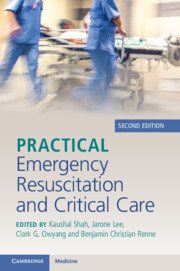Book contents
- Practical Emergency Resuscitation and Critical Care
- Practical Emergency Resuscitation and Critical Care
- Copyright page
- Contents
- Contributors
- Preface
- Section 1 General Critical Care
- Section 2 Infectious Disease Emergencies
- Section 3 Neurological Emergencies
- Section 4 Cardiovascular Emergencies
- Section 5 Respiratory Emergencies
- Section 6 Gastrointestinal Emergencies
- Section 7 Renal Emergencies
- Section 8 Hematology–Oncology Emergencies
- Section 9 Endocrine Emergencies
- Section 10 Environmental Emergencies
- 43 Anaphylaxis
- 44 Hyperthermia
- 45 Hypothermia
- 46 Overdoses
- Section 11 Trauma
- Section 12 End of Life
- Index
- References
44 - Hyperthermia
from Section 10 - Environmental Emergencies
Published online by Cambridge University Press: 02 November 2023
- Practical Emergency Resuscitation and Critical Care
- Practical Emergency Resuscitation and Critical Care
- Copyright page
- Contents
- Contributors
- Preface
- Section 1 General Critical Care
- Section 2 Infectious Disease Emergencies
- Section 3 Neurological Emergencies
- Section 4 Cardiovascular Emergencies
- Section 5 Respiratory Emergencies
- Section 6 Gastrointestinal Emergencies
- Section 7 Renal Emergencies
- Section 8 Hematology–Oncology Emergencies
- Section 9 Endocrine Emergencies
- Section 10 Environmental Emergencies
- 43 Anaphylaxis
- 44 Hyperthermia
- 45 Hypothermia
- 46 Overdoses
- Section 11 Trauma
- Section 12 End of Life
- Index
- References
Summary
The human body has many physiological compensatory mechanisms such as shivering and sweating for maintaining a state of thermal homeostasis. Occasionally, these mechanisms become overwhelmed, resulting in a continuum of heat-related injuries and illnesses. Heat edema, syncope, cramps and exhaustion comprise the milder manifestations of temperature illness. This chapter focuses on the more critical presentations of hyperthermia, including heatstroke and toxicological hyperthermia.
- Type
- Chapter
- Information
- Practical Emergency Resuscitation and Critical Care , pp. 453 - 464Publisher: Cambridge University PressPrint publication year: 2023

